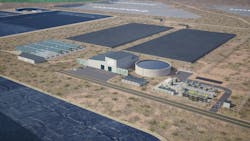Pasco adapts to rising industrial demands with new facility
Location: Pasco, Washington
Project size: 8.64 MGD
Facility size: 8.64 MGD
Budget cost: $150 million
In 2022, Darigold, a large dairy cooperative, announced a new $600 million facility to be built in Pasco, Washington. The Process Water Reuse Facility (PWRF) in Pasco was already strained, supporting five growing food processing plants in the region. The city captures, treats and applies the wastewater to 1,800 acres of city-owned farmland.
Servicing a large new customer like Darigold required the city to expand. The Pasco Resource Recovery Center (PRRC) represents a nearly $150 million capital investment to expand the city’s existing PWRF.
The city of Pasco decided to expand its current operations to meet the region’s current and future economic and sustainability needs. Expansion included building an anaerobic digester facility that would produce renewable natural gas (RNG) that will be used to heat residential homes.
The city issued an RFP in 2022, which was won by Burnham RNG. The city and Burnham then entered a 30-year public-private partnership (PPP) in 2023 in which Burnham will build, own and operate a new Pasco Resource Recovery Center wastewater treatment facility.
“The PPP allowed the city to achieve an aggressive timetable to keep the financing separate from their broader municipal system,” said Chris Tynan, founder and CEO of Burnham RNG.
The PRCC is the largest part of Pasco’s PWRF which consists of five lift stations connecting the discharge of seven industrial facilities, more than 300 million gallons of water storage and greater than 2,000 acres of farmland on which the treated water is applied in addition to the PRRC.
Completion of the 18-month project is slated for December 2024.
The new facility is set to remove nitrogen from wastewater, protect local groundwater and supply a balance of nutrients for organic soil amendments locally. The project is said to support more than $800 million of local investment and create 100’s of jobs.
RNG production includes tax credit shared with the city to reduce net wastewater treatment costs. The city expects enough RNG to heat 4,500 homes.
“RNG serves two purposes,” said Jason Meloy, general manager at PRRC . “It reduces the city’s overall net treatment costs and, equally important, achieves an environmental goal of ‘industrial symbiosis’.”
Having won an request for proposal for a sixth food processor, Pasco had to act quick to expand wastewater treatment capacity. This accelerated the timeline to expand and resulted in the partnership with Burnham RNG. The PPP enabled both entities to commence construction under a series of work acceleration agreements.
Budgeting for the facility quickly rose as a prominent challenge. Pasco was able to monetize investment tax credits by recycling the industrial wastewater to produce clean energy in the form of RNG. The city was able to lower the net cost to build the new facility by capturing its biogas, water and fertilizer value.
“Complexity was driven by the timetable and the integration of the innovative RAB system,” said Aaron Townsend, president of Swinerton Energy, Inc. “Both challenges were solved by excellent communications.”
Collaboration of multiple stakeholders, including Burnham RNG, Gross Wen, Xylem (Evoqua) and Cascade Natural Gas, allowed for an expedited process. The city will utilize Evoqua low-rate anaerobic digesters to improve stability and biogas production. Pasco will enable the reuse of an estimated 1.5 billion gallons of wastewater per year.
About the Author
Alex Cossin
Associate Editor
Alex Cossin is the associate editor for Waterworld Magazine, Wastewater Digest and Stormwater Solutions, which compose the Endeavor Business Media Water Group. Cossin graduated from Kent State University in 2018 with a Bachelor of Science in Journalism. Cossin can be reached at [email protected].

